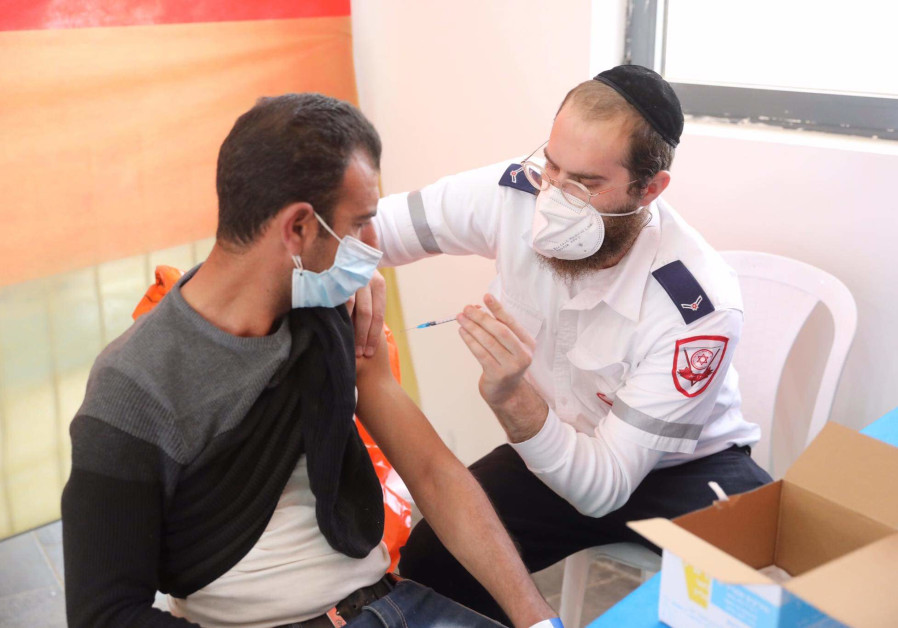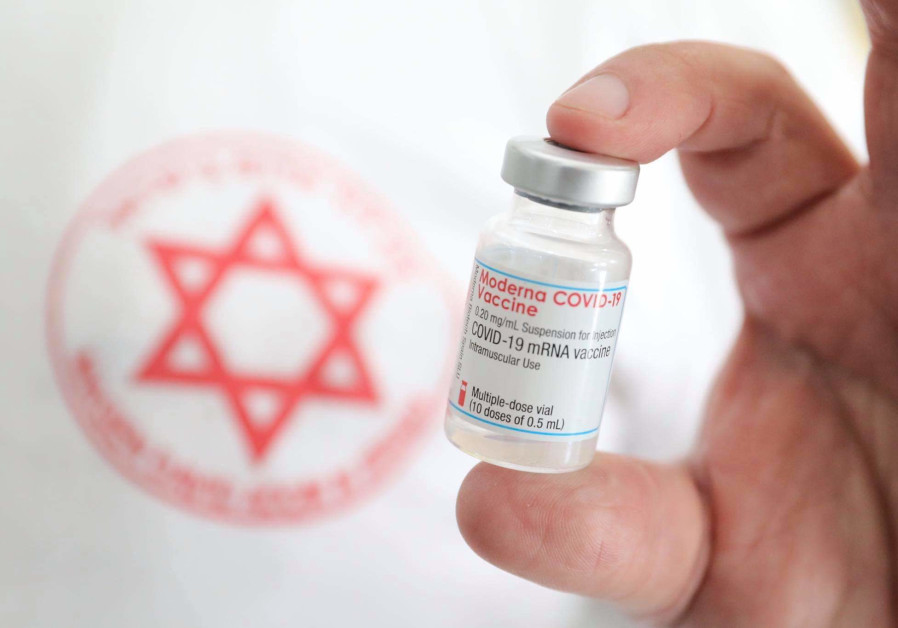She was among the first 21,000 Palestinians to receive the vaccine in a joint operation run by the Office of the Coordinator of the Government Activities in the Territories (COGAT), the Health Ministry and Magen David Adom that began Monday.

“I trust it [the Israeli vaccine] more,” said Ouanina, a resident of the nearby village of Battir.
As she sat on a white plastic chair in a large bare room at the bottom of a small commercial center, Ouanina said she was lucky to have been inoculated thanks to her work as a housekeeper in nearby Neveh Daniel.
The PA has done little to help its people receive a vaccine, she said, adding that its best advice was for people to refrain from going to work and to “just stay home.”
Israel has vaccinated more than five million of its citizens. The number of infections has started to drop, and the country has begun to reopen for business.
The PA is relying on a lockdown strategy as it scrambles to acquire vaccines. So far, only 22,000 vaccines have entered the Gaza Strip, and another 10,000 have gone to the West Bank.
The program to vaccinate Palestinians who have work permits to enter Israel, including the settlements, represents the best chance Palestinians have to receive the vaccine.
Israel has been under fire for prioritizing its citizens first in the vaccination process. Critics believe Israel should have distributed the first 10 million doses, enough for five million people, it received from Pfizer equitably between Israeli citizens and Palestinians in the West Bank and Gaza.
Israel plans to prioritize the Palestinians once its own vaccination program is completed. It has argued that under the Oslo Accords, the PA is responsible for the healthcare of its citizens. In addition to the workers’ program, it also gave the Palestinians 2,000 doses of the Pfizer vaccine and pledged an additional 3,000.
Col. Eyal Zevi, COGAT’s head of Operational Department, spoke of the importance of vaccinating Palestinians on Monday, when the IDF opened eight vaccination centers at the crossings into Israel.
“The virus knows no geographical borders, and therefore, the vaccination of the Palestinian workers is a common interest for both parties,” he said.
On Tuesday, Health Minister Yuli Edelstein visited Barkan Industrial Park in Samaria to make the opening of its vaccination center for the Palestinians who jointly work with Israelis in the factories located there. Both he and Samaria Regional Council head Yossi Dagan congratulated the first Palestinian worker who was vaccinated at the site.
At both locations, Edelstein spoke of the importance of coexistence with the Palestinians as exhibited in the joint industrial areas of Barkan and Ariel.
This is what the future should look like, he said, adding: “This is the future. This is peace. This is coexistence.”
Efrat Regional Council head Oded Ravivi said: “Coronavirus teaches us how important good neighborliness is; how good relations between settlers and Palestinians can be when we cooperate.”

Hanadi Abdo, a cashier at the Rami Levy supermarket near Gush Etzion junction, said inoculation was a work requirement, but she was glad for the option because she is exposed daily to a constant stream of people.
“We need this,” she said, adding that luckily, her two adult daughters are college students and were also able to receive vaccines.
“I wanted to get vaccinated. I don’t want corona,” Abdo said, adding that she also had a 13-year-old daughter whose safety she had to think of.
Walid Ahmad Abu Swai, a plumber from Bethlehem and a father of four, was in Efrat with his son, who also received the vaccine. His other son was also able to get vaccinated, but his two daughters and his wife were not.
Mahmoud Zohada, the head of a construction team in Efrat, said his father had already been stricken and recovered from the disease.
“I was in isolation for five weeks,” the father of four said, adding that he convinced those who work for him to get vaccinated.
Zohada is waiting for the second vaccine, which will be available to the 120,000 workers in a month.
Eyad Abu Hammad said if it were up to him, he would ward off COVID-19 with hot water, lemon and garlic rather than risk taking the vaccine.
“I know many people who have had COVID-19 and were fine,” he said, so when push came to shove, he was more concerned about the inoculation than the disease.
“I was afraid because I don’t know enough about the vaccine,” Abu Hammad said, adding that there were still many unanswered questions about the long-term impact of vaccination.
Still, the father of five from the West Bank village of Wadi an Nis, southwest of Bethlehem, found himself in the unique position of being the only one in his family of seven with the option to receive the vaccine.
Abu Hammad said he did not have a choice. His employer in Neveh Daniel said he could only come to work if was vaccinated.
After receiving his shot, the IDF gave him a vaccination certificate on a small white piece of paper, and his friend took a photo of the moment.
Afterward, all he felt was a small headache, he said.
With the shot and without the shot, “I’m leaving my fate in God’s hand,” Abu Hammad said.•
